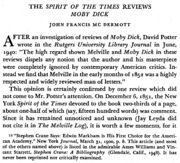The Spirit of the Times Reviews Moby Dick
From 1850s
Contents |
[edit] The New England Quarterly, Vol. 30, No. 3. (Sep., 1957), pp. 392-395.
[edit] John Francis Mc Dermott
[edit] Summary
This piece of literary theory from the late 50's is very akin to what we are engaging in right now in this program. Mc Dermott's primary emphasis in the piece is the contention that even upon it's initial release in 1851; Moby Dick still won very favorable reviews by prominent literary circles and critics of the day. He believes that the old argument that the novel was outrageously un-popular upon its publication, is a hack argument and deserves further investigation into critical history.
[edit] Quotes
[edit] Quote #1
After an investigation of reviews of Moby Dick, David Potter wrote in the Rutgers University Library Journal in June, 1940: "The high regard shown Melville and Moby Dick in these reviews dispels any notion that the author and his masterpiece were completely ignored by contemporary American critics. Instead we find that Melville in the early months of 1852 was a highly respected and widely reviewed man of letters." (392)
[edit] Quote #2
Melville's graphic power and the corrective effect of his novels were to the reviewer only part of his achievement. "Taken as matters of art these books are amongst the largest and freshest contributions of original thought and observation which have been presented in many years." Most modern writers merely "elaborate and rearrange" the "common fund" of ideas, the "same overdone incidents" out of Scott and Radcliff. "It is only now and then, when genius, by some lucky chance of youth, ploughs deeper into the soil of humanity and nature, that fresher experiences-perhaps at the cost of much individual pain and sorrow-are obtained; and the results are books, such as those of Herman Melville and Charles Dickens." (393)
[edit] Quote #3
As a romance its characters are so new and unusual that we doubt not it will excite the ire of critics. It is not tame enough to pass this ordeal safely. Think of a monomaniac whaling captain, who, mutilated on a former voyage by a particular whale, well known for its peculiar bulk, shape, and color-seeks, at the risk of his life and the lives of his crew, to capture and slay this terror of the seas! It is on this idea that the ro- mance hinges. The usual staple of novelists is entirely wanting. . . . (394)
[edit] Quote #4
...which he thought a good specimen of Melville's "graphic power of description." Moby Dick, he concluded, was a "work of exceeding power, beauty, and genius." (395)

